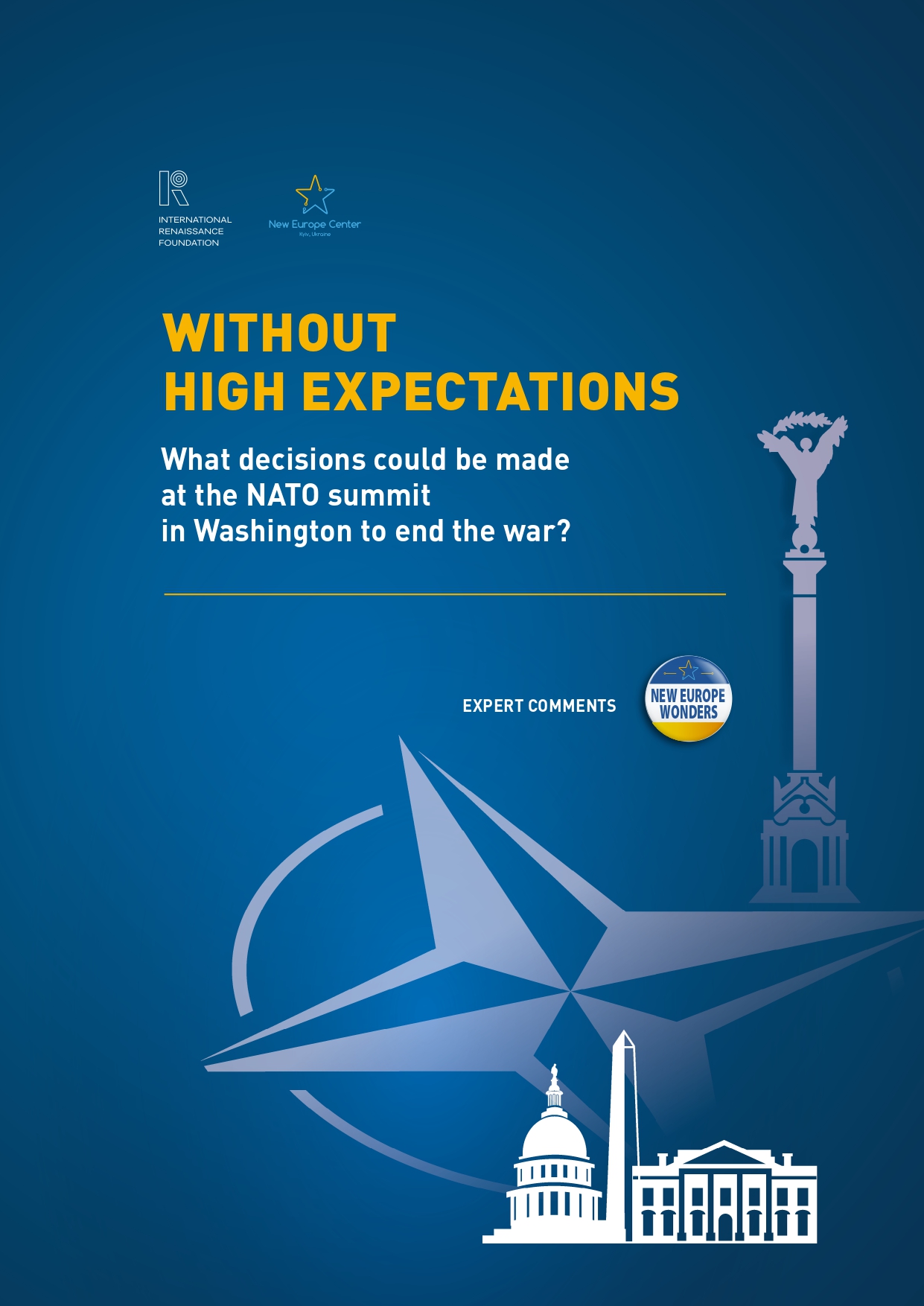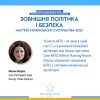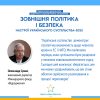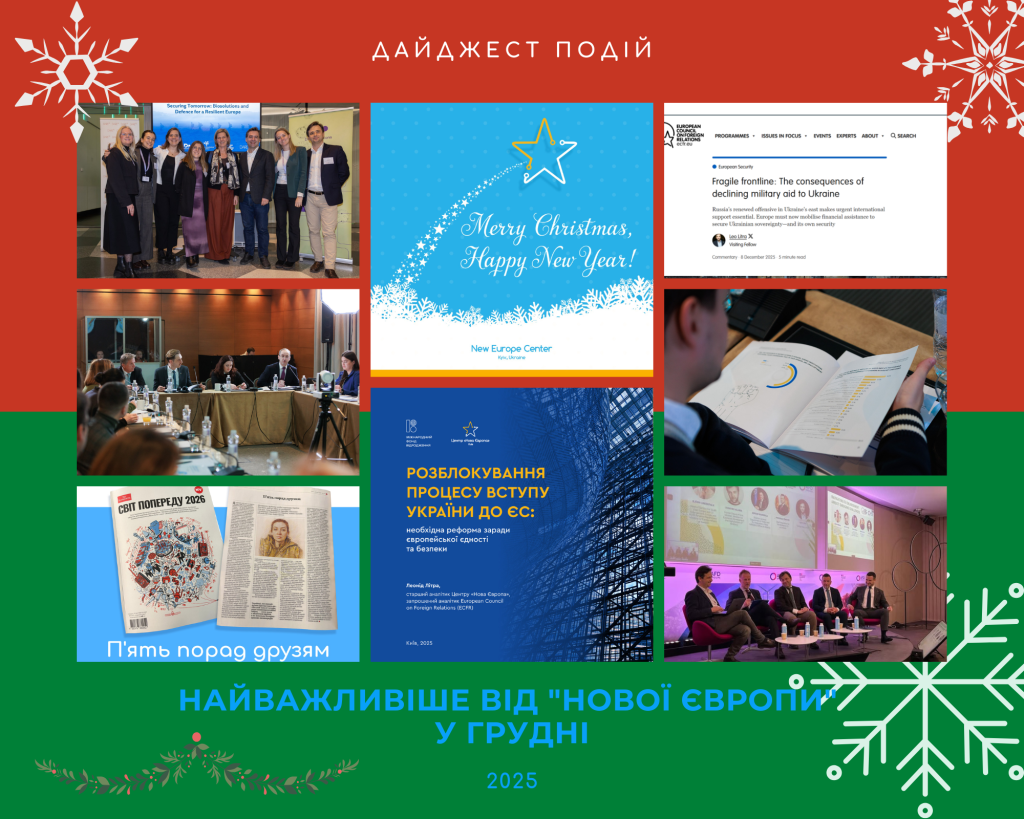What decisions could be made at the NATO summit in Washington to end the war?
The 75th Annual NATO Summit will take place on 9-11 July 2024 in Washington, D.C. Despite members of the Alliance have already stated that Ukraine should not expect an invitation to NATO, discussions are still going on: what other decisions Kyiv can count on? NATO reassures: they will be strong and demonstrate unwavering support for Ukraine. Will this be the case? Can such decisions bring Ukraine’s victory closer? The New Europe Center in partnership with TSN.ua asked influential experts: What decisions could be made at the NATO summit in Washington to end the war?
Gustav C. Gressel, Senior Policy Fellow, European Council on Foreign Relations (ECFR), Germany
Regarding the upcoming Washington summit, it is better to manage expectations beforehand. There will be no big decision on any matter that touches Ukraine: neither on enlargement, not on security guarantees. Since the beginning of the full-scale invasion, NATO countries are first and foremost concerned about their own security, ramping up defence-expenditures, improving NATO’s force posture on the eastern flank, and re-discovering common military structures for planning and organising a common defence. Only the Baltic Countries and Denmark have prioritised the support for Ukraine over NATO incrementalism.
Furthermore, the alliance is split on the aims of the war. France and most NATO members want Ukraine to win and restore its territorial integrity. But the biggest single providers of military assistance, the US and Germany, only want the war to freeze. Then Turkey and Hungary have revisionist agendas on their own, happy to spoil any compromise.
The “freezers” harbour the illusion that any pre-determination of Ukraine’s future would make it more difficult to start negotiations. This is a grave error. Russia will not enter serious negotiations as long as it has a valid chance for full military victory. Changing that is a matter of military support for Kyiv. Ukraine on the other hand is reluctant about negotiations because it already made bad experiences with “good faith” ceasefire with Moscow. Without security guarantees and NATO membership guaranteed by the West, it will see any ceasefire as a mere tactical break for Russia, which will rearm and regroup and then strike again.
It is puzzling that the US and Germany, the two countries aiming at a freeze, are also the reluctant parties when it comes to Ukraine’s NATO membership (which would be the only carrot incentivising Kyiv to accept such a freeze). But there are many puzzling and self-contradicting elements in German and American foreign policy.
Katri Pynnöniemi, Associate Professor at the University of Helsinki, and Sinikukka Saari, Research Director at the Finnish Institute of International Affairs, Finland
The Washington summit will mark the 75th anniversary for NATO. Despite this historical momentum, the expectations are currently running low on NATO’s role in promoting peace in Ukraine. Even the credible maintenance of the current level of support and commitment for Ukraine seems like a cause for celebration for many.
While the current level of military support might – just might – stop Russia from achieving its maximalist, colonialist goals in Ukraine, a more comprehensive, strategic approach is needed to guarantee the Ukrainian independence and security in the future.
To be free, truly sovereign and to be able to prosper as a country, Ukraine needs victory. To be able to pursue the policy of dignity its people have chosen, Ukraine needs victory. To be able to be what they have been and to stand for what they have stood for the past 75 years, the west and NATO need Ukraine to win – and to join the alliance.
The Washington summit needs to signpost Ukraine’s concrete path to NATO accession. This would not yet resolve all the fundamentals that are required for ending the war, but it is a step further for achieving sustainable peace for Ukraine and Europe.
James Sherr, Honorary Fellow, International Centre for Defence & Security, Tallinn; Associate Fellow, Russia & Eurasia Programme, Chatham House, London
NATO’s Washington summit will mark its 75th anniversary. It will not only be an occasion for celebration, but a moment of truth. The truth is that NATO’s principles — the impermissibility of Russia’s occupation of Ukrainian territory and the demand for its unconditional withdrawal — will be rendered risible and impotent if the Alliance does not increase the efforts and risks it is prepared to take on Ukraine’s behalf. Tangible actions — the rendering of all assistance to Ukraine short of war, the removal of restrictions against targeting Russian forces on Russian soil — will matter far more to the future of Ukraine and the standing of NATO than artful formulas about Ukraine’s membership prospects.
NATO must face a second truth. Unless it responds robustly and effectively to Russia’s hybrid attacks, the risk of a wider war will increase. Hybrid war is not soft war. It encompasses not only disinformation and intimidation, but disruption, sabotage and murder. Its intent is not only to test the West’s capacity and cohesion but shape the future battlefield.
Consensus will not be reached on all of these points in Washington, but discussion must be sober, realistic and unconstrained. NATO must emerge stronger after the summit than before. Time might not be on its side.
David Satter, Journalist and Historian, the USA
War is a test of will. To win, the NATO countries must demonstrate a commitment to principle. The NATO countries have imposed thousands of sanctions on Russia which have proven ineffective. They now need to impose financial sector sanctions on Russia and on every financial system that allows Russia to carry out international trade, including those of the Central Asian nations, Mongolia and Armenia. Such sanctions have the potential to accomplish what existing sanctions have not done which is to cause the Russian economy to collapse.
NATO leaders need also to inform their populations and the people of Russia about how Putin came to power. There is overwhelming evidence that the bombings of the Russian apartment buildings in 1999 were carried out by the Russian intelligence services in order to elevate Putin to the presidency. They were followed by other terrorist acts and led directly to the mass slaughter and human wave attacks of the present war. The fact that Putin came to power as the result of an act of terror against his own people demonstrates his character better than any other historical episode. The truth can clarify the stakes in the present war for populations assaulted by Russian disinformation.
Ben Hodges, Former Commanding General of the US Army Europe, the USA
Three things that should happen at the Summit:
#1 The US and the Allies should use this Summit as a serious opportunity to agree on strategic outcome for the war in Ukraine, to help Ukraine defeat Russia. This, like the Arcadia Conference of 1942 and the Casablanca Conference of 1943, could be the key meeting where leaders agree on strategic priorities and outcomes. It should not be just focused on the celebration of 75 years of NATO, although that is an important milestone.
#2 The US and the Allies should agree to offer NATO membership to Ukraine in a very concrete, specific, unmistakeable way that is not tied to Russian activities but to our own interests in deterring Russia from further aggression.
#3 The US and the Allies should continue to build on the results of the Vilnius Summit of 2023, specifically completing and exercising the Family of Plans for regional defense.
Sylvie Kauffmann, Editorial Director & Columnist at Le Monde, France
It is difficult to state that any decision taken at the upcoming Washington NATO summit will end Russia’s war of aggression in Ukraine. Even granting membership to Ukraine on the spot, which will not happen, would be a huge gamble – it could end the war but it could just as well widen it by bringing NATO into the conflict.
What could help Ukraine win the war would be to invite the country to join NATO on a parallel path to the path towards the European Union. By offering Kyiv a clear perspective of accession, NATO will not be directly involved in the war but will support Ukraine’s war effort and will provide Ukraine with the best security guarantees if negotiations are held. The wording of this perspective should definitely be more precise and more firm than what was agreed at the Vilnius summit last year.
Nico Lange, Senior Fellow at the Munich Security Conference
The Summit in Washington D.C. should make a decision to invite Ukraine for membership accession talks to NATO. Unfortunately, the U.S. and Germany seem to be strinctly blocking such a decision. I think the U.S. notion of describing decisions taken at the Washington summit as a “bridge to NATO” is not helpful. Nobody wants to live on a bridge or under a bridge.
Other decisions could transform the Ramstein format into more of a NATO format. This would only be helpful to Ukraine, if NATO could turn into a clearing house, making Ukrainian battlefield logistics easier and allowing for better military and capability planning.
Nicolas Tenzer, guest professor at Sciences Po (Paris), non-resident senior fellow at Center for European Policy Analysis
Unfortunately, it is to be feared that the forthcoming NATO Summit will not send out clear signals about Ukraine’s accession, and in particular will not give a precise and clear date for this. Due to the opposition of the United States and Germany, this 75th anniversary summit runs the risk of repeating the strategic errors of the Vilnius summit in 2013, which itself seemed a kind of repeat of the Bucharest summit in 2008, which had left the field open to Russia in Georgia and Ukraine. This mistake is rooted in the refusal of several states to review NATO’s long-standing jurisprudence whereby it would be impossible to admit a country at war. For Washington in particular, the main concern since Obama seems to be to avoid long-term involvement in a conflict in which the United States would, by definition, be the most engaged country. For Germany, the fear of a direct conflict with Russia is also permanent.
However, to put an end to Russia’s all-out war against Ukraine, failing Kyiv’s immediate accession, the only solution would be to have NATO in Ukraine, or at least a large number of Alliance countries directly involved. Despite the removal of the US Congress’ obstacle to the supply of weapons to Ukraine, and the end of the taboo — affirmed by several states (including the USA, the UK, France, Germany, Poland, the Czech Republic, the Baltic States and several Nordic states) — of direct strikes by Ukraine on Russian territory and airspace, which had been long overdue, this will not be enough for Ukraine to push Russian forces out of its territory. These weapons — and there are too few of them, especially fighter jets — will enable Ukraine to defend itself and stabilize the front, but not to undertake a victorious reconquest. In one way or another, forces from NATO countries will have to participate in the reconquest. This inconvenient truth has yet to be expressed by Western leaders. It is hard to see that Western leaders, if they are serious about their proclamations of non-negotiable Ukraine’s territorial integrity and if they finally have a strategy that goes beyond the incremental approach implemented so far, are seriously discussing the different options, even though the presence of countries more than ambiguous towards Russia around the NATO Council table will not make the task easy. Nor is it clear that this can be made public.
Behind these questions lie existential issues for the future of the Alliance. Even though Ukraine is not yet a member, and has not officially received a MAP, the strict division in terms of security guarantees, as defined by Article 5 and specified by Article 6 of the Washington Treaty, is becoming less and less relevant as the Russian attack on Kyiv also constitutes a direct threat to member countries. Moreover, NATO’s intervention at the end of the war in former Yugoslavia sets a good precedent in this respect, and NATO is also subject to the enforcement of the Responsibility to Protect (R2P). This case also illustrates a reality that is sometimes overlooked: Article 5 does not rely exclusively, or perhaps even primarily, on nuclear deterrence, but on conventional deterrence. This is the deterrent that would have to be deployed if a NATO country, such as Estonia, were to be attacked by Russia. Finally, what would be the Alliance’s credibility in the medium term if it refused to fight the battles that are decisive for the security of the whole of Europe and beyond? We all know that the real front is in Ukraine, and NATO can neither abstain nor think it could be leading from behind.
Kevin Ryan, retired brigade general of the US Army, former US Defense Attache to Russia, independent Specialist
At the NATO Summit meeting in Washington this July, it will be vital that the NATO members present a robust and unified response to Russia’s aggression against Ukraine which has been going on since 2014. The summit will undoubtedly issue a strong condemnation of Russia’s war in Ukraine, but concrete steps are required to bring about an end to this war; one which will ultimately restore Ukraine’s sovereignty and guarantee its freedom. Because, if Russia can deprive Ukraine of those fundamental rights, it will be more likely to deprive other neighboring countries of those rights as well.
Building toward that strategic goal, NATO members should strive to include the following in their decisions:
- NATO members should increase the production of weapons and ammunition not only for NATO’s own defenses but also for Ukraine’s use as it fights first against Russia. Ukraine has made clear their priorities for assistance and NATO has done much to meet those needs. But more is required to balance the defense production of Russia supported by regimes like China, North Korea, and Iran.
- NATO members should commit to provide these weapons and ammunition to Ukraine without restricting their use against military targets on Russian territory. Russia itself is already using weapons and ammunition provided by its supporters throughout the territory of Ukraine. Russian military commanders are firing into Ukrainian cities from behind the safety of their own border, all the while striving to erase Ukraine’s borders.
Some NATO members are considering moving their training of Ukrainian soldiers inside the country. This should happen. It will speed and improve the training.
NATO members should also support the establishment of an air defense umbrella over the major cities of western Ukraine. Today, places like Kyiv, Lviv, Odesa, and Mykolaiv, are subjected to consistent Russian attack by missiles, drones, and bombs, killing hundreds of civilians and destroying important infrastructure. Deploying friendly ground-based air defenses around these cities, far from the battlefield front lines, would intercept the missiles and drones, without the risk of allied forces killing Russian soldiers. Thousands of Ukrainians would be saved.
Finally, NATO should accelerate the process of accepting Ukraine as a member. Russia’s leader, Vladimir Putin, has made it clear that the war he is waging is a war against NATO and the West. Ukraine is fighting the first battles of a war that is directed against us. NATO and the West would be strengthened in our defenses against Russia by Ukraine’s membership. Any steps toward bringing Ukraine into NATO will help us all.
Wolfgang Ischinger, former Chairman of the Munich Security Conference and former German Ambassador to the US and UK
The NATO Summit 2024 has one central mission: to demonstrate to Putin that Russia will have no chance whatsoever of prevailing in Ukraine, and that the Alliance stands by the sovereignty and territorial integrity of Ukraine.
PDF-version is here.
The rubric is prepared with the support of the International Renaissance Foundation. The material reflects the position of the experts and does not necessarily coincide with the position of the International Renaissance Foundation.








